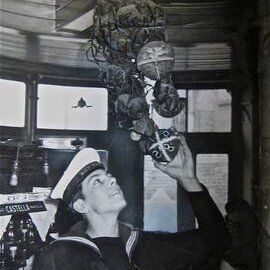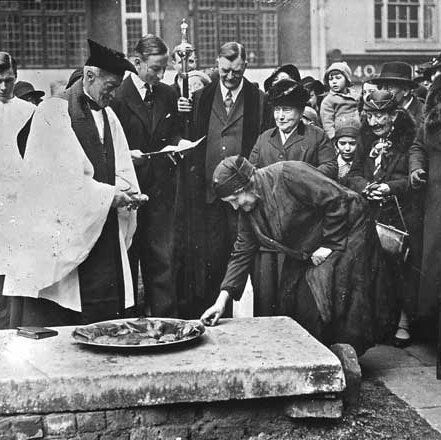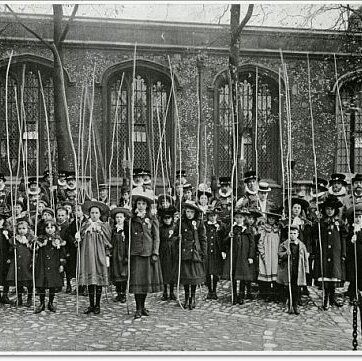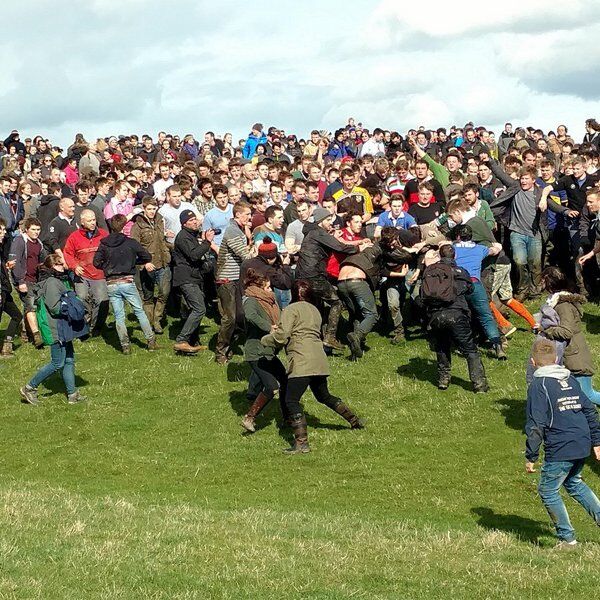Chocolate. That’s what Easter boils down to for many in England today: egg hunts, roast dinners and chocolate. There’s nothing wrong with that, of course, but the Easters of the past used to be a tad more wacky. All manner of strange dances, competitions and celebrations used to take place. Unfortunately, these have for the most part ended. Despite this, however, there are a few areas of London and the wider UK in which they can still be seen going strong.

The Widow’s Buns
Londoners in search of a slice of old-fashioned Easter eccentricity need look no further than the Widow’s Son in Bromley. This Victorian building may look like your average pub, but head inside and you’ll notice something that’ll make it stand out from the crowd: a huge net full of hot cross buns hanging above the bar.
Tasty!
You might want to stop and think for a minute before you dig in, however. Some of those buns are older than your grandparents. They have been accumulating there, one every Good Friday, since the early 1800s.
Legend has it that an old widow, on receiving news that her son would return from fighting in the Napoleonic Wars that Easter, decided to bake him a hot cross bun to welcome him home. Easter came and went and the son did not return. Despite this, she did not give into despair.
Every year after that, on Good Friday, she would bake a fresh hot cross bun in the hopes that this was the Easter that her son would finally come home.
When she died a huge net of pastries were found hanging from the ceiling of her cottage.
Although the story of the net’s origin could aproprychal, its discovery inspired a new tradition. When, in 1848, a pub was built on the site of her old cottage, it was named The Widow’s Son in her honour. A new hot cross bun has been added to her collection every Good Friday since.

The Widows’ Sixpence
Even more central, and also named for widows, is the annual Easter tradition of St Bartholomew the Great in Barbican, London’s oldest parish church.
Visit here on Good Friday and expect to witness a rector standing over a grave and declaring, ‘are any poor widows present who are in need of 20 shillings?’ Rarely, these days, does anyone in the crowd raise their hand, but this ritual is steeped in a history of almsgiving.
A century ago it was a serious and ceremonial affair. A 1902 account details twenty one widows each approaching the grave in turn and collecting from it a single silver sixpence. It then describes them being given a hot cross bun and offered a steadying arm as they completed a ritualistic walk across the tombstone.
This tradition was formally established in 1887, when legal publisher Joshua Butterworth established a trust in support of the poor widows of the parish. It is likely much older than this, however, and by some accounts is ancient. The church itself dates back to 1123.

Beating Of The Bounds
Oldest and most central of all of London’s outlandish Easter traditions is the beating of the bounds at the Tower of London.
Today, this involves Beefeaters and children marching the perimeter of the Tower grounds and whipping its iron markers with sticks, but its origins are in a 17th Century riot.
In 1698, an angry group of Londoners gathered outside the Tower in protest of state land seizure. Eight years prior to this the King had granted the expansion of the Tower’s boundaries, depriving locals of land that had formerly been theirs. The protest was most likely an attempt to dispute the new boundaries, but was ultimately unsuccessful. The expansion was not overruled until 1894.
Beating of the bounds, in general, has its origins in Anglo Saxon times and continued to be a popular way of re-establishing boundaries and warding off evil spirits into the Mediaeval era and beyond. As is the case with the Tower of London, it is generally practised on Ascension Day, 40 days after Easter, when Christ is said to have ascended into heaven.

Beyond London
Britain’s bizarre Easter traditions do not stop at London. Up and down the country, local communities can be seen celebrating the period in wild and eccentric ways. Here are a couple of our favourites:
Bottle Kicking, Lancashire- For over 200 years the villagers of Hallaton and Medbourne have welcomed Easter Monday in with a good old game of bottle kicking. What is this? Well, a huge game of football with a bottle for a ball and rules that include no eye-gouging and very little else.
Egg Jarping, County Durham- The residents of Peterlee, County Durham have hosted the prestigious egg jarping world championship on Easter weekend for over 30 years. Here, athletes compete to see whose hard boiled egg can sustain the least amount of damage when tapped against a competitor’s. Cracking stuff.
Orange Rolling, Bedfordshire- Pretty self explanatory really. A group of grown adults roll oranges down a steep hill near Dunstable whilst being pelted with fruit of every description, all to the comforting sounds of Punch and Judy mixed against the Salvation Army band.
Happy Easter everyone! No matter how you’re celebrating.
Interested in discovering more strange pockets of London history? Try one of our Scavenger Hunts in London - untangle cryptic clues as a team, as you are taken on a journey around the most unique, unusual and bizarre corners of London.